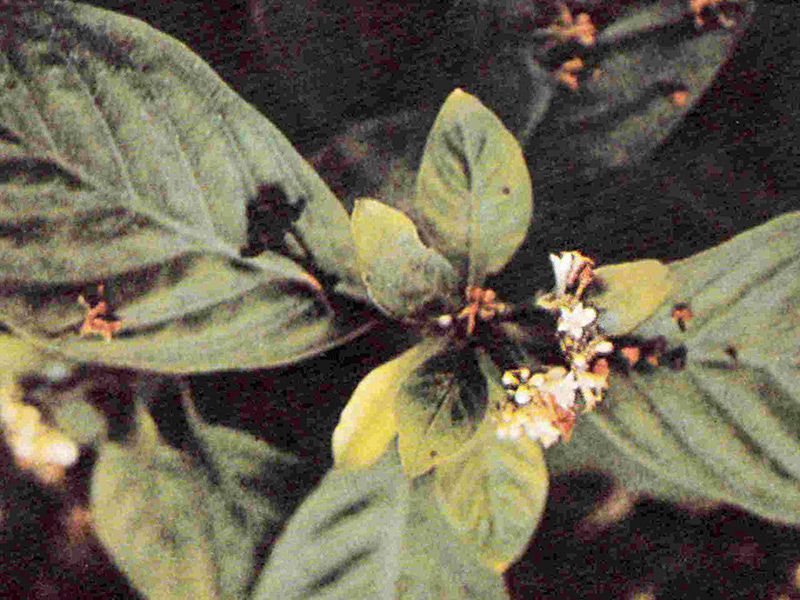Botanical name
Carapichea ipecacuanha (Brot.) L. Andersson
[Syn.: Cephaelis ipecacuanha (Brot.) Willd., Cephaelis acuminata H. Karst]
Family
Rubiaceae
Common name
Ipecacuanha, Ipecac, Ipecac root
Information about the plant
The ipecac grows as a small shrub in sparse forests in tropical Brazil, particularly in the provinces of Mato Grosso and Minas Gerais. The drug (Matto Grosso ipecacuanha) is mainly sourced from Mato Grosso. Another drug source is C. acuminata, which is widespread in Central America and is traded as Costa Rica ipecacuanha.
The name “ipecac” (also known as “ipecac root”) indicates, that the underground organs - root and rhizome - are used, and that these parts have an emetic effect. The species epithet ipecacuanha comes from the Tupi language, in which i-pe-kaa-guéne means “plant from the roadside that makes you ill”.
The ipecac is a shrub up to 40 cm tall, with 2 to 4 mm thick roots and somewhat thinner secondary roots. The leaves are opposite, have entire margins, and very prominent stipules. There are several small, bell-shaped flowers at the ends of the branches, from which fleshy, initially red, then black drupes form after fertilization.
Medicinally used parts of plants (herbal drug)
The dried, underground parts of the 3 to 4-year-old plant (Ipecacuanha root - Ipecacuanhae radix) are used.
The commercially available drug comes mainly from wild stocks in Mato Grosso, Brazil (Mato Grosso ipecacuanha).
Constituents of the herbal drug
Ipecacuanha root contains isoquinoline alkaloids, mainly emetine and cephaeline, with psychotrine and methylpsychotrine as secondary alkaloids. Emetine is responsible for the nausea-inducing effect (Latin 'emittere' = to send out).
Quality of the drug
The quality of the following drugs or drug preparations is specified in the European Pharmacopoeia (Ph. Eur.):
- Ipecacuanha root (Ipecacuanhae radix)
- Standardised Ipecacuanhae powder (Ipecacuanhae pulvis normatus)
- Ipecacuanhae tincture (Ipecacuanhae tinctura normata)
- Standardised Ipecacuanha fluid extract (Ipecacuanhae extractum fluidum normatum)
Medical applications
Recognised medical use
As ipecacuanha root contains highly potent alkaloids, the drug has not been assessed by the HMPC or ESCOP.
The mucolytic and expectorant effect of the drug is used phytotherapeutically in low doses. The area of application of corresponding preparations (only in combination with other drugs) is, for example, spasmodic cough, to promote expectoration, and to relieve the urge to cough. A further therapeutic indication for combination preparations with low doses of ipecacuanha root is for gastrointestinal complaints.
The nausea-inducing effect of ipecacuanha root is used in drug investigations when it is suspected that narcotics have been swallowed in gastric juice-proof packaging for transportation. Ipecacuanha root is then used to induce vomiting.
Traditional use
Due to the content of strongly emetic isoquinoline alkaloids, ipecacuanha root cannot be classified as a traditional herbal medicinal product
Herbal drug preparations in finished dosage forms
Ipecacuanha root is a component of homeopathic cough preparations in combination with other medicines in homeopathic dilutions (including thyme, aniseed, sundew, grindelia, Iceland moss, ivy, eucalyptus).
The preparation contains
- Cephaelis ipecacuanha (Ipecacuanha) homeopathic mother tincture.
- Cephaelis ipecacuanha (Psychotria ipecacuanha, Ipecacuanha) homeopathic dilutions D2 to D5.
Dosage
Finished medicinal product: see patient information leaflet.
Tea: tea must not be used due to the strong emetic effect of ipecacuanha root.
Preparation of a tea
Not applicable.
Notes
Ipecacuanha root must not be taken during pregnancy and lactation, and its use in children and adolescents under the age of 18 is also not recommended (with the exception of homeopathic preparations).
Side effects
Nausea.
Interactions
None known.
References
Herbal drug monographs
WHO Vol. 3
Further literature
Commentary on the European Pharmacopoeia (Ipecacuanha root, 0094; Standardised Ipecacuanha powder, 0093; Standardised Ipecacuanha tincture, 1530; Standardised Ipecacuanha fluid extract, 1875)


